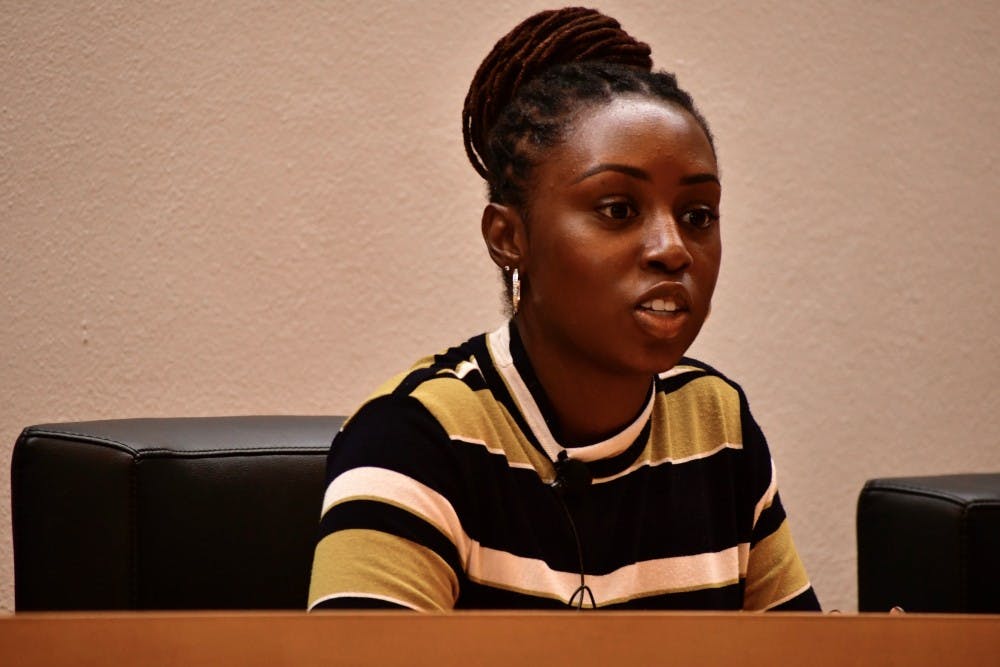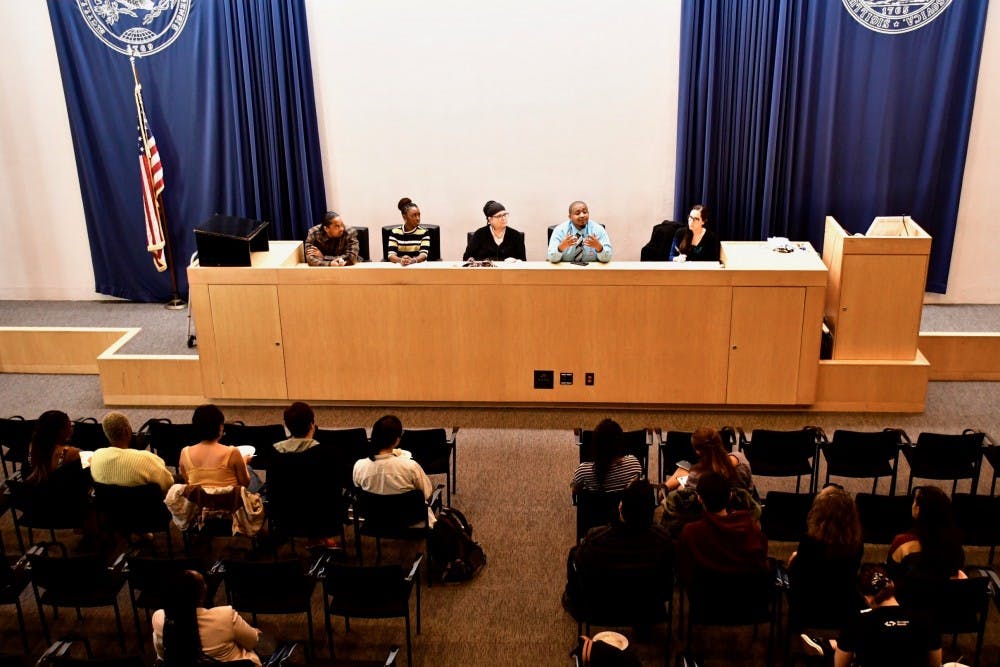From “Ban the Box” to Title IX Reform, to the protests at last week’s dedication of the Woodrow Wilson installation, the University has been no stranger to student activism in the past year.
On Saturday, at “Organizing from the Margins: Speaking Freely on Lived-Experiences, Protest, and Princeton,” student activists and University community members heard from activist leaders who, in the words of co-founder of the Newark Water Coalition Anthony Diaz, are “dealers in hope.”
At the event, the Whig-Cliosophic Society hosted Anthony Diaz, Lydia Thorton, an activist with the N.J. Campaign for Alternatives to Isolated Confinement; Alexis Miller, lead organizer of the Patterson, N.J., Black Lives Matter chapter and a law student at Rutgers University; and Antonne Henshaw, Vice President of Women Who Never Give Up, Inc., in the Whig Senate Chamber at 2 p.m. on Saturday. The talk was moderated by Lecturer in African American Studies Dannelle Gutarra Cordero.
Cordero asked the speakers what advice they would give to the student activists in the audience. Diaz emphasized that students needed “to have a team.”
“You cannot do this alone,” Diaz said. “You will burn out, and the world needs you.”
Diaz added that activists had to ask themselves “how far are you willing to go?,” and said, “this life has consequences.”
Miller and Thornton expressed similar sentiments to Diaz. Miller said, “coalition building is going to be your best friend,” while Thorton asked the audience to “imagine what we could do as a group.”
“You never know where your help is gonna come from,” Thorton said. “Support each other.”

Henshaw compared confronting systematic racism and the people who defend them to “snake handling.”
“I had to learn, at 18 years old, 5’4’’, 118 pounds, how to navigate the snake pit to get here,” Henshaw said.
Henshaw shared the story of his incarceration. He served 30 years for murder, seven of which he spent in solitary confinement. While incarcerated, Henshaw earned his law degree from Rutgers.
During the talk, he decried the structural racism and violence that he said underlies the American legal system, and emphasized the importance of fighting internal battles as well as external ones.

“Anybody that’s in New Jersey State is not supposed to make it out, you’re supposed to die,” Henshaw said. “You’re living in your coffin.”
Henshaw talked about returning to his hometown of Camden, N.J., and the importance of looking at the larger structures of racism rather than just individuals.
“Instead of indicting the people, I began to look at the structural violence of my city that made it possible for open-air drug addicts, homelessness, hunger, [and] violence to exist in a public space,” Henshaw said. “As long as it was black and brown bodies, it was policed. Now that it’s black, brown, and white bodies, they look the other way.”
The guiding question for the talk, asked by Cordero, was, "How does your activism generate visibility, advocacy for those who are silenced and how does it challenge hegemonic institutional oppression?"
Diaz described his work in fighting the lead crisis and emphasized that the goal of the organization was not to give “handouts.”
“What the Newark Water Coalition does is really try to empower people,” Diaz said. “We need to work together and build power. We need to organize. We need to mobilize.”
According to Diaz, the coalition has met with the governor’s office, created fellowship opportunities, and protested at a number of public events. Diaz emphasized advocacy as being “part of [the] community” and “helping others empower themselves.”
“It’s a process and sometimes it’s a painful process too, but I wouldn’t trade it for the world,” Diaz said.
Thorton introduced herself to the audience as a “previously incarcerated individual.”
“What it allowed me to do, having been incarcerated, is meet some of the most amazing people, and most talented people in my life,” Thorton said. “Now that I’ve been there and survived and come out, not just prison but solitary confinement, that means that I have to be part of the change. I can’t just sit back.”
Thorton cited her most recent success in advocacy as convincing Governor Phil Murphy to sign a bill limiting solitary confinement, which had been vetoed by former Governor Chris Christie three years prior. She said, however, that such a step was far from the “end of the journey.”
“When you talk about advocacy and activism, the journey starts when something like that bill gets signed, ’cause now we have to make sure it’s actually implemented,” Thorton said.
Thorton reflected on the disadvantages formerly incarcerated people face when reentering the job and housing markets, comparing their criminal records to the red “A” symbol, placed on adulteress, in Nathaniel Hawthorne’s “The Scarlet Letter.”
“What we do today is we wear what I call the Scarlet F [for felon], except it’s not visible until you write it on paper, until you’re required to answer questions about your background,” Thorton said.

Alexis Miller speaks during the panel.
Photo Credit: Jon Ort / The Daily Princetonian
Miller worked with the NAACP in high school, in what she called “good old fashioned community service,” but said she and others like her “felt like we needed to do something bigger.”
Miller has organized a number of protests, which she described as “flooding the streets,” and said she works to fight not only “state-sanctioned violence,” but also “any issues that threaten the livelihood of black people, period,” which includes advocating for the enrollment of black law students.
“This is about holding our institutions accountable for the work they need to do,” Miller said.
Nathan Poland ’20 and co-president of SPEAR KiKi Gilbert ’21 helped to organize the event. Poland called the conversation “an empowering experience” and “the best way for me to express myself and to exercise my freedom of speech.”
Concurrently with the panel, Whig-Clio hosted University of Pennsylvania Robert Mundheim Professor of Law Amy Wax, who spoke at a separate event, entitled “Speak Freely: A Conversation.” Cordero mentioned the Wax event, to which “Organizing from the Margins” was organized directly in response, during her introduction, referring to Wax as “a proponent of scientific racism.”
“Amy Wax is speaking at Princeton, spreading hate towards people of color,” Cordero said. “Amy Wax proclaims the superiority of ‘white culture.’”
“This aims to be alternative safe space,” Cordero added. “This hopes to be a reparative space.”
Cordero also critiqued the endorsement by President Christopher L. Eisgruber ‘83, little after having defended Professor Rosen's use of the n-word in the classroom as a "pedagogical choice," of the work of the other speaker at the “Speak Freely” event, Professor Keith Whittington, as the Class of 2022 pre-read. Cordero argued this selection of the pre-read was “abominable and strategic.”
Leopoldo Solis ’21, who attended the “Organizing from the Margins,” described the talk as “a very productive response to having a white supremacist coming to speak on campus.”
“Students who are willing to confront a lot of hateful rhetoric, which is disguised as being an issue of free speech, are here and really willing to speak out and come together,” Solis said.
Another audience member, co-president of SPEAR Amanda Eisenhour ’21, praised the event as a creative alternative to a regular protest, forming a “new space” and “repurposing University resources.”
Gilbert said the intention was to create an “alternate space” for those affected by white supremacy. She said it was a “shame” that the Whig-Clio trustees insisted on bringing Wax, whose prior visit had been canceled last spring.
Henshaw also responded to a question during the Q&A session about the event’s relationship to Wax coming to speak, saying, “I don’t even know who Amy Wax is — I don’t even know to be offended.”
“See how her venom doesn’t work?” Henshaw asked. “You have to be relevant … who are you?”








